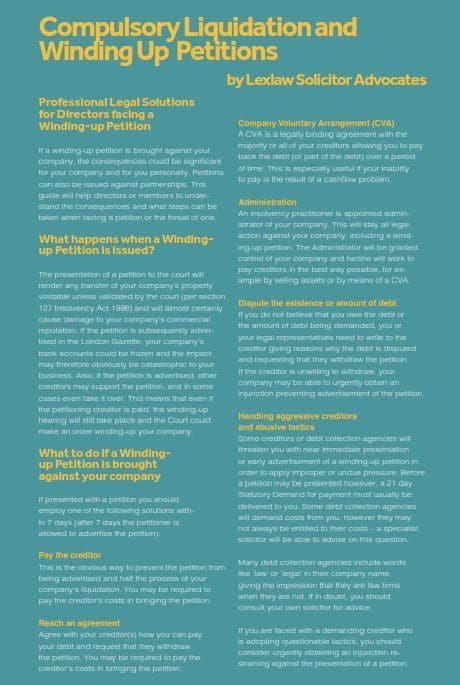Unveiling the Idea of Corporate Voluntary Agreement (CVA).
In-Depth Evaluation: The Process and Value of Company Volunteer Contracts
Corporate volunteer arrangements play an essential function in shaping the landscape of business obligation and sustainability methods. These agreements are not simply contractual arrangements however rather strategic efforts that signify a dedication to moral business conduct and stakeholder engagement. Comprehending the complex process associated with creating these arrangements and the meticulous methods used during negotiations offers valuable insights right into the characteristics of company decision-making and the quest of shared value. As we check out the intricacies of application, monitoring, assessment, and conformity connected with these agreements, a deeper recognition of their influence on service procedures, track record, and social well-being arises. The significance and complex benefits of company volunteer arrangements appear, yet the nuances of their implementation and the difficulties encountered in their adoption warrant more detailed evaluation.

Comprehending Business Volunteer Contracts
When delving right into the world of business volunteer agreements, it is necessary to understand the fundamental concepts guiding these strategic arrangements. Corporate voluntary contracts are formal commitments made by services to attain details social, ecological, or ethical purposes past lawful needs. These arrangements are willingly become part of by firms to demonstrate their dedication to accountable organization practices and sustainability.
One trick facet to recognize concerning business voluntary arrangements is that they are positive steps taken by business to deal with social concerns and improve their total effect. By willingly devoting to specific standards or efforts, organizations display their commitment to business social duty and stakeholder engagement.
Additionally, company voluntary contracts frequently entail cooperation with numerous stakeholders, including government bodies, non-governmental companies, and communities. This multi-stakeholder method makes certain that the arrangements are detailed, clear, and straightened with the rate of interests of all included celebrations.
Basically, recognizing corporate voluntary arrangements requires a deep gratitude of their voluntary nature, the purposes they aim to achieve, and the collective initiatives they require to drive positive change in the company landscape.
Arrangement Refine and Techniques
Efficient negotiation procedures and methods play an important role in the effective implementation of business voluntary arrangements. The arrangement procedure involves numerous celebrations coming together to get to an equally helpful arrangement that fulfills the interests of all stakeholders entailed.
Approaches such as energetic listening, open interaction, and analytical orientation are important in cultivating a collective settlement environment. Energetic paying attention makes certain that all events feel listened to and understood, leading to raised trust and participation. Open up communication helps in making clear misconceptions and building agreement on vital concerns. An analytical positioning motivates innovative reasoning and a focus on searching for options instead of dwelling on past complaints.
Additionally, maintaining a professional and respectful mindset throughout the negotiation procedure is key to building strong relationships and achieving effective results. By using efficient arrangement procedures and techniques, firms can browse complicated contracts much more successfully and make certain the lasting application of voluntary dedications.
Application and Compliance Actions
Having successfully developed a strong structure via reliable settlement procedures and methods, the following important phase includes the precise planning and implementation of implementation and conformity measures in corporate volunteer arrangements. Application steps include the actual deployment of the agreed-upon terms and actions detailed in the voluntary arrangement. This stage demands careful sychronisation among all involved celebrations to make certain that the agreed-upon campaigns are implemented properly and effectively.
Compliance steps play an essential role in making sure that all corporate voluntary agreement parties included stick to the conditions and terms defined in the voluntary agreement. Monitoring systems, periodic evaluations, and transparent reporting systems are typically used to track progression and make certain responsibility. Non-compliance can result in reputational damages, legal implications, and a failure of count on among stakeholders, underscoring the significance of durable conformity actions.
To improve the performance of execution and compliance procedures, clear interaction, normal tracking, and quick rehabilitative actions are necessary. By focusing on these elements, organizations can support the stability of their volunteer agreements and attain the wanted outcomes while fostering depend on and responsibility within the company environment.
Tracking and Examination Techniques

Examination, on the various other hand, entails the organized assessment of the end results and influences of the voluntary agreements - what is a cva in business. By evaluating the performance of the executed steps, firms can determine whether the desired goals are being achieved and identify locations for renovation. Assessment methods may consist of studies, meetings, information analysis, and other techniques to collect pertinent details for assessing efficiency

Effect and Advantages of Contracts
In recognizing the efficiency of business voluntary contracts, it is essential to analyze the concrete effect and advantages that these contracts bring to both business and stakeholders. Company volunteer agreements frequently lead to improved functional efficiencies within business.
Moreover, company volunteer arrangements can cultivate far better partnerships in between stakeholders and companies. By proactively engaging with stakeholders to set usual objectives and requirements, companies can construct trust fund, openness, and cooperation. This can lead to stronger partnerships, enhanced stakeholder loyalty, and inevitably, long-term business success. Furthermore, these agreements usually drive development and competition within markets, as firms aim to meet and surpass voluntary dedications, bring about favorable results for both business and the bigger society.
Conclusion
In verdict, business volunteer contracts play a vital function in promoting sustainability and business social responsibility. Overall, corporate volunteer agreements are a useful device for driving favorable modification and promoting sustainable service methods.
Company volunteer arrangements play a pivotal function in shaping the landscape of company responsibility and sustainability techniques.Efficient arrangement processes and approaches play a critical duty in the effective implementation of corporate volunteer agreements.Having actually efficiently developed a strong structure with reliable arrangement procedures and methods, the following vital phase includes the meticulous planning and implementation of application and conformity procedures in company volunteer agreements (what is a cva agreement?).In comprehending the efficiency of corporate voluntary arrangements, it is necessary to evaluate the concrete influence and advantages that these agreements bring to both companies and stakeholders.In final thought, corporate volunteer agreements play a vital duty in promoting sustainability and corporate social obligation